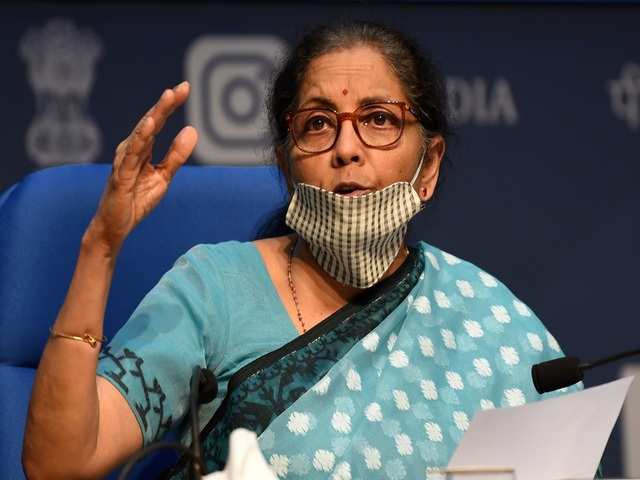
From the PMO to FM Nirmala Sitharaman, Khadi masks are in vogue during Covid-19
Khadi & Village Industries Commission has already sold 6.5 lakh masks since the time it started production in April. The masks are available in different variants for men and women.
by Neha DewanIf you followed Finance Minister Nirmala Sitharaman’s economic stimulus announcements spread out over five days closely, one thing would have stood out — the appearance of a new mask each day.
While some of them were keenly matched with her attire in their fashionable pinks and summery greens during the media briefings, others added a variety of hues to her serious persona.
Earlier in May, Sitharaman had tweeted pictures of khadi masks by Khadi & Village Industries Commission (KVIC) saying that these are breathable and elegant to use. KVIC, which assists in the establishment and development of khadi and village industries, started making masks in April from their napkins stitching centre in Nagrota, Jammu. “We converted it into a khadi masks’ stitching centre, producing 10,000 masks daily. Cotton and silk together act as mechanical and electrostatic barriers respectively to protect against disease. We have sold 6.5 lakh masks so far and the demand has just been continuing,” says Vinai Kumar Saxena, Chairman, KVIC.
Typically, each artisan at the centre makes 80-100 masks in a day. Awareness of the masks is being created through KVIC’s social media channels. The government body received orders from a host of dignitaries, including the Rashtrapati Bhavan, Prime Minister’s Office, Central Government ministries, J&K government and orders through email from the public. Besides sales, over 7.5 lakh khadi masks have been distributed free to the district authorities by 2400 khadi institutions across the country.
The masks come in different variants for men and women. There are double layered cotton masks for men in two colours priced at Rs 25/piece and triple layered ones with two inner layers of cotton and one layer of silk fabric for women available for Rs 75/piece. The masks for women have been made in multiple colours and have adjustable ear loops as well. “These are special masks for women in attractive colours. The loop is also beautiful and women will like to wear these,” adds Saxena who reiterates this in the context of khadi being a fashionable must have in wardrobes.
Vocal for Local
The KVIC chief believes that the popularity of khadi fabric also falls in line with the PM’s message of ‘Vocal for Local’ in good measure. “Khadi is our very own fabric. Buying it then is contributing to our own country. We fulfill all categories of local products which are of good quality. The khadi fabric is unmatched - no machine can make 500 count fabric which has the intricacies of hand spun and hand woven elements. It is environment friendly and is the greenest fabric of all,” he highlights.

Interestingly, the popular khadi face mask is now set to go “global”. KVIC is exploring the possibility of exporting the khadi cotton and silk face masks to foreign countries after the Ministry of Commerce and Industries lifted the ban on export of non-medical/ non-surgical masks of all types. The masks will be supplied to countries like Dubai, USA, Mauritius and several European and Middle East countries through the Indian embassies.
Saxena says the export of khadi masks is an appropriate example of ‘Local to Global.’ “The export of khadi masks will lead to a spike in production and ultimately create large scale employment opportunities for artisans in India. Face masks are the most critical tool to fight the Corona pandemic. These masks prepared from double twisted khadi fabric not only meet the quality and scale of demand, but are cost effective, breathable, washable, reusable and biodegradable” he stated in a PIB release.
They are specifically using double twisted khadi fabric for manufacturing of these masks as it helps retain moisture content inside, while providing an easy passage for the air to pass through.
Other products related to the fight against Covid-19 are being readied as well. While sanitisers and liquid soaps were already being produced by their artisans in the Village Industries, work has now been ramped up in these units to meet the additional demand coming in. PPE kits, which have also been developed, are currently in the testing stage.
Next are plans to give preference to those projects under the Prime Minister Employment Generation Programme (PMEGP) which are involved in making ventilators or ventilator related equipment, N-95 masks and other allied accessories.
Time and again, the acceptance of khadi has also been reflected in the consistent upward movement in its numbers and scale. In FY 20, KVIC registered a turnover of close to a whopping Rs 90,000 crore, up 16% from that of FY 19. Production and sales have seen a spike too since 2015-16. As per figures, the production of khadi which was pegged at Rs. 1066 crore in FY 16, shot up to Rs. 2292.44 crore in FY 20, registering an increase of over 115%.
The sale of khadi, on the other hand, stood even higher. The sale of khadi fabric products increased by 179% from Rs 1510 crore in FY 16 to an overwhelming Rs. 4211.26 crore in FY 20.